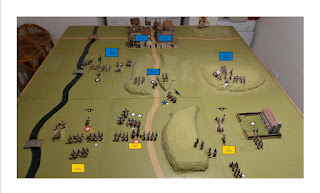28 May 1813 -
Southern Germany - Day 8
Massena is determined to hold the line Oberaudorf-Kufstein-Worgl
7th army hold Oberaudorf
8th army defend Kufstein
9th army hold Worgl
Schwarzenberg is running short of supplies, but orders the attack on
Kufstein
1st army retreat to Walchsee
2nd army attack Kufstein
3rd army hold Kitzbuhel
Battle of Kufstein
– Move 2
This photo is taken at the end of move two.
The Bavarian/Baden hold a very strong defensive position in front of the
city of Kufstein
Half of 12th Baden corps started the game on the left bank of
the river
However they have now crossed the river to join the rest of the corps
Apart from the field army, there are also two militia brigades in
garrison in Kufstein
The Austrians have entered the table and are faced with a difficult
choice.
An attack on the left will be outflanked by the Bavarian reserve on the
pass
An attack on the right will have to take the strong hill
An attack in the centre will have to fight its way through the pass
All three options will be very time consuming
Schwarzenberg decided to pin the left and right and drive the centre
back
He would then swing his reserve to their right to outflank the hill.
The photo shows the Austrian advance.
The reserve cavalry (centre) are charged by Bavarian cavalry
4th corps cavalry join the melee and rout the enemy cavalry.
By nightfall nine Bavarian and Baden brigades are in rout
Remainder are all shaken, including the garrison of Kufstein
The Austrians have defeated the Bavarian army, but it has taken too long
The Bavarians still hold the town, and can claim a victory
The French have lost 14 infantry, 5 cavalry and 2 artillery casualties
(6300 men)
The Austrians have lost 9 infantry.3 cavalry and 2 artillery casualties
(4100 men)
Comment
This game was a
perfect example of a delaying battle.
The Bavarians could decide whether to hold the town itself, and engage
the Austrians as they approached. Or
they could opt to try to hold the major high ground in the centre of the
table.
They decided on
the latter. The weak point is the pass
in the centre. The CinC created a
reserve of two infantry and one cavalry brigades to hold this area. But he had to hold the southern end of the
pass, and he had to hold the high ground on both sides of the road.
The Austrians
created a similar reserve, but could choose which side of the road to concentrate
their attack. The Bavarian cavalry tried
to slow down this attack, and also did so.
However the support of 4th corps cavalry turned the tide and
they were routed.
The Austrian
reserve now moved right and supported 3rd corps attack on the
hill. It was now just a matter of time before 11th
Bavarian corps was defeated. Too late
in the day they tried to retreat, but were surrounded and crushed.
On the opposite
flank it was a more even battle between 12th Baden and 4th
Austrian corps. The Austrians
eventually won, but not until very late in the day. The outcome here was less important,
providing that the Baden corps were not allowed to move to support Kufstein.
The final attack
on Kufstein started on move 10, against 43 brigade in the right hand section of
the city. The Bavarian reserve of two
infantry brigades had redeployed between the town and the pass. 3rd Austrian corps were the only
troops available to attack, and they had already lost their artillery and
cavalry. So it was down to an infantry
melee just outside the city.
The Austrians
won, and two brigades attacked the town on move 12, just as night fell. The garrison was shaken, but managed to hold
(even though only poor class militia).
The attackers were also shaken, and could not launch another attack that
night. It would take too long to replace
them with fresh troops, so the Bavarians remained in control of all of Kufstein
at the end of the battle. They could,
and did, claim a victory.
At the end of
the battle there were five Austrian infantry brigades and one battery who were
not shaken or in rout. Every single
Bavarian and Baden brigade were either in rout or shaken.
It would be
pretty well impossible for the Bavarian/Baden army to hold the city for a
second day of fighting. But that had
also seemed the case at Obersdorf, and they actually won the second day of
battle there.
But now the
Austrian army was desperately short of supplies. All six armies had suffered heavy
casualties, though not as much as the Bavarian/Baden army. If Schwarzenberg risked a second attempt to
take Kufstein, and failed, his whole army might well be destroyed.
Overnight both
commanders would study the strength returns and supply reports and decide who
would blink first!






